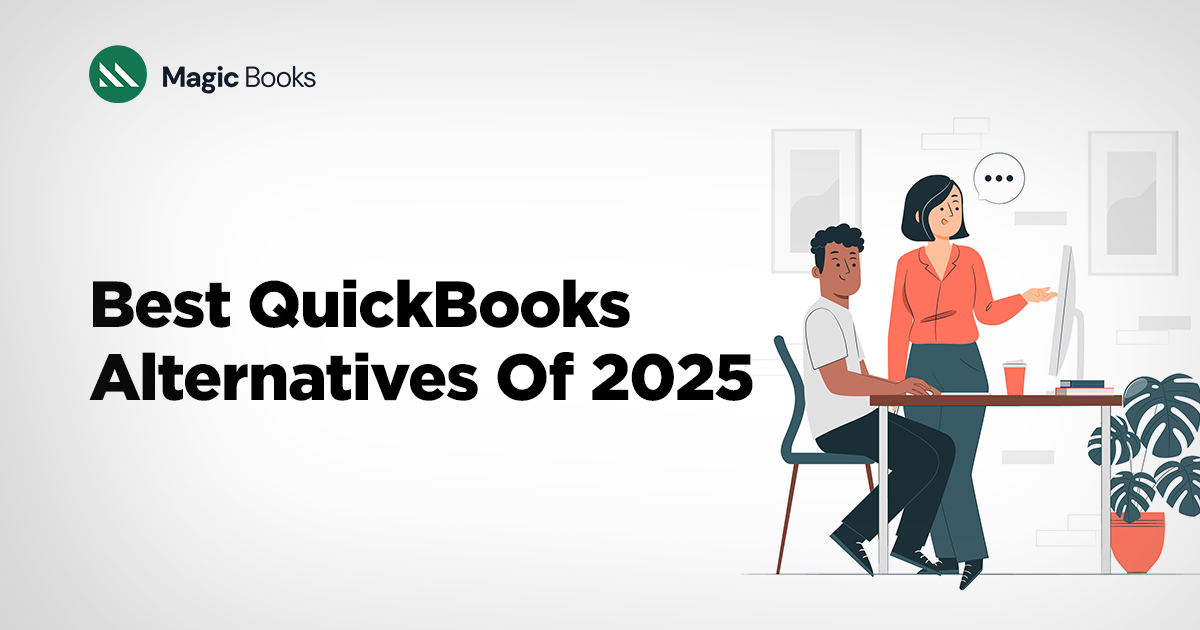Today’s business situations indicate an immensely changing world of finance and firms of all sizes continuously look for solid, dependable, and newer accounting solutions. With its advent well into 2025, quite a number of enterprises seem to be a little skeptical with software like QuickBooks and have opened talks about alternatives. For long, QuickBooks has been the trusted software among many companies, but a growing number are exploring fresh approaches with more automation backed by feature sets tailored to their specific needs that wholesale promise newer approaches with increased automation and feature sets. This blog talks about 8 of the best QuickBooks alternatives of 2025 and their merits, specialties, and how they tackle contemporary accounting issues while remaining easy to navigate.
Factors to Consider:
There can be a multitude of reasons to move away from QuickBooks, including cost, more features, or a willingness to use a more modern, cloud-based service for accounting. As technology advances, business owners are evolving their expectations of their accounting software to serve functions that don’t just keep the numbers in line but also enable those treasurers and controllers to drive and strategize growth. Each alternative examined here rests to the credit of innovation and dedication to understanding the modern business platform. Their offerings are not static; they are always evolving based on customer feedback and current development trends in financial technology. It is this flexibility that allows customers to operate in a future-oriented manner.
Furthermore, the human factor in these platforms cannot be overstated. In many cases, businesses are not just purchasing software; they are acquiring a partner to guide them through the challenges of modern finance. From very intuitive user interfaces to friendly and proactive customer support, right through to all the training resources available, these QuickBooks alternatives are built with their users firmly in mind. They realize that the whole point of any accounting system is to free up precious time and mental bandwidth to allow business owners and finance professionals to concentrate on strategic initiatives instead of getting bogged down in administrative work. User-friendly designs and strong support networks inspire confidence and empowerment in users, which helps businesses be more successful overall.
Xero:
Among the leading wave of a new generation of accounting solutions is Xero. Established slowly yet surely, Xero is now recognized as an all-in-one flexible cloud-based accounting software that offers a seamless user experience. The distinguishing feature of Xero is its easy interface and vigorous integration with third-party applications. It provides sufficient capacity to keep small to medium-sized organizational accounts in check: Invoicing, bank reconciliations, expense tracking, and payroll is done with a click. The cloud-first approach is especially appealing to businesses that want real-time financials and easy collaboration with accountants or colleagues. Focusing more on scalability and accommodating user needs, Xero adds new features as businesses grow and add complexity, making it an ideal solution for companies evaluating a transition from manual activities to automated software solutions.
FreshBooks:
Another fintech company rivaling QuickBooks is FreshBooks, which made a name for itself primarily by catering to freelancers and small business owners. This versatile yet simple-to-use platform helps small business owners, freelancers, or anyone running a business with fewer skills in accounting manage their finances with confidence. In let alone the detailed time tracking, invoicing and expense management it offers, that user-centric interface just makes book-keeping quite a head-scratching endeavor for these individuals. Apart from its traditional accounting features, the service is known to stand out in project-based billing, thus favoured by service-seater industries. Along with human-centred design, FreshBooks development keeps rolling with AI technology and automated systems to cut down on boring manual work. This kind of design makes it easy for users, even those not well-versed in finance, to learn how to use it quickly, giving them more trust in managing their financial health.
Zoho Books:
Zoho Books is another notable alternative that has been gaining traction, especially with small and midsize businesses. Integrated into the broader Zoho ecosystem, Zoho Books takes advantage of seamless integrations with a variety of other business applications, such as Zoho CRM, Zoho Inventory, and Zoho Projects. These integrated systems come together, creating a full-fledged business management solution that extends far beyond simple bookkeeping activities. With automated workflows, multi-currency support, and a powerful reporting system providing clear insights into business financial affairs, Zoho Books is feature-rich with a cloud-based backbone, it gives users access to their data from anywhere, which is increasingly important as work becomes more mobile. It is also touted for superior customer support and constant improvements, making it a safe bet for companies needing functionality along with a helpful community.
Sage Business Cloud:
Well, if someone puts the stock on an alternative with a proven history in accounting, then Sage Business Cloud Accounting remains the heavyweight choice. For decades now, Sage has been synonymous with reliable accounting solutions, and its cloud offering doesn’t deviate. Sage Business Cloud Accounting is designed to cater to both small businesses and grown businesses, thereby providing features that support invoicing, cash flow management, and extensive financial reporting. One of the advantages of Sage Business Cloud Accounting is that its in-depth features arise from many years of experience in the financial sector. Its ability to satisfy somewhat complex accounting tasks while being easy to use for individuals who are not accounting savvy has also assured continued popularity. Moreover, the attractiveness of utilizing Sage, especially in the highly regulated industries that may need to maintain security and compliance, is therefore welcomed by such companies protecting sensitive financial data.
Wave:
Wave offers an impressive scope of features free of charge, including invoicing, receipt scanning, and basic accounting functionalities. Although Wave may lack the complex automation or bountiful integrations that other competitors have, this simplicity and cost-effectiveness make it extremely attractive to startups and small businesses. It functions great for companies just starting to establish their financial processes by providing an easy-to-use solution without breaking the bank. Wave is far from sloppy “just because it is free”; it has garnered good reviews from users for its user-friendly designs. With that high level of simplicity, even someone without much or any accounting experience could quite successfully navigate the software without any stress to focus rather on expanding the business.
Kashoo:
Kashoo is another popular alternative, offering simplicity and straightforwardness in cloud accounting. Since its inception, Kashoo has been designed around simplifying processes, providing a good platform for the small business proprietor/freelancer who crave a more hands-off experience. The software automates many repetitive tasks, such as categorizing expenses and creating invoices. This frees time for higher-value activities. Kashoo has a clean and uncluttered interface, designed with the user in mind, minimizing the learning curve and reducing the need for massive training. In addition, it supports multi-currency transactions and integrates with various third-party applications to ensure even the most foreign-exchange-viable businesses can feel at home with Kashoo. In a world where the operability of such systems is an utmost necessity, affordability and ease of use have made Kashoo a favorite of users craving to work without the hassle of thousands of features that complicate day-to-day operations.
FreeAgent:
FreeAgent rounds off our list of QuickBooks alternatives for the year 2025. Developed for small business owners and freelancers, FreeAgent provides an entire suite of features meant to simplify the complexity of managing finances. The platform excels in areas including invoice management, expense tracking, and timekeeping-all critical for independent contractors and small teams. FreeAgent distinguishes itself through its advanced, yet simplified overview of a business’s fiscal health, allowing users to easily follow their cash flow and fiscal performances through deep-dive dashboards and reports. Further, transactions become updated in real-time through FreeAgent’s bank and payment gateway integration, thus doing away with possibilities for error and delay. Focused on delivering a complete, uncomplicated accounting solution, FreeAgent would appeal to anyone monetarily wanting a QuickBooks alternative that truly grasps what modern small businesses require.
We Have Yet Another Choice to Beat the Rest…
Magic Books™ – A Professional Accounting and Bookkeeping Service for SMBs and Enterprises
Magic Books™ is our premium service, facilitating a transition from financial to taxation, thus enhancing business management that welcomes growth and efficiency. With Magic Books™ on board, professional services sectors have truly changed is all about precision, proactivity, and money, and a whole lot of it. Building beautiful estimates, and invoices, troubleshooting inventory, collecting online payments seamlessly, and checking on outstanding payments-everything rendered in one neat package-Magic Books™ is built for those who are serious about growing their sales without compromising their financial well-being.
Magic Books™ goes beyond accounting. It delivers a full range of complete accounting services: statement preparation, bookkeeping, tax planning, and preparation, budgeting and forecasting, tailored financial analysis and reports, accounts payable and receivable management, bank reconciliations and manufacturing reports, internal audit and assurance, expense tracking, and dedicated business financial consulting. This comprehensive approach guarantees coverage of all aspects of financial management with precision.Finally, the search for the best alternative to QuickBooks in 2025 has been characterized by differing options that strangely cater to varied business needs and preferences. Be it in favor of the like of live collaboration that Xero allows, the much simpler interface of FreshBooks, the whole integrated ecosystem of Zoho Books, the long-standing reliability of Sage Business Cloud Accounting, the pricing-friendly nature of Wave, the ease of use of Kashoo, or the comprehensive oversight offered by FreeAgent, and of course our beloved MagicBooks– names of innovative solutions change each day with technology. But given the myriad solutions available would seem an ideal recommendation is specific to your own business’s requirements, workflow priorities, and likely goals. Just take those considerations into account while landing your eyes on the various features each platform offers, and then you will certainly be well-placed to choose an option that not only improves your accounting discipline but also pours your business for further growth.



